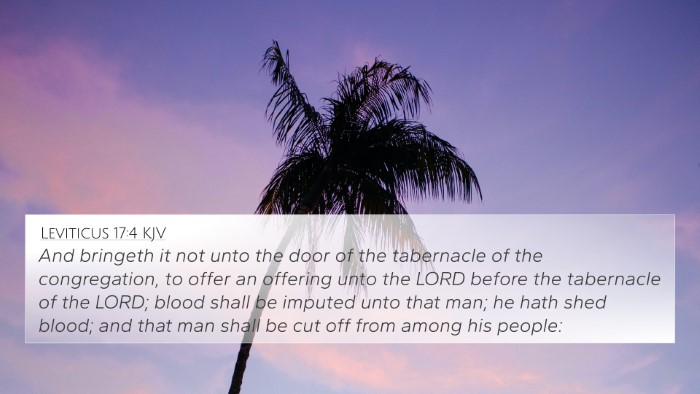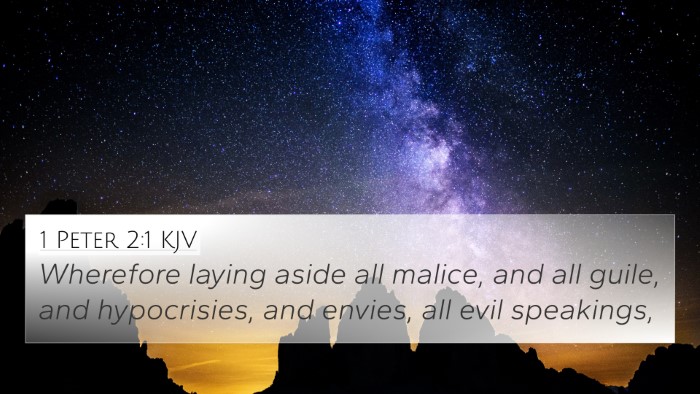Psalms 32:2: "Blessed is the man unto whom the Lord imputeth not iniquity, and in whose spirit there is no guile."
Meaning and Interpretation
This verse from Psalms highlights the profound blessing that comes to those whose sins are not counted against them by God. It speaks to the themes of forgiveness, purity of spirit, and the joy of being counted righteous before the Lord.
Insights from Public Domain Commentaries
- Matthew Henry:
Henry emphasizes that the true happiness of a believer is found in their justified state before God. He notes that this blessing is not based on human merit but is a divine gracious act. True blessedness involves relief from guilt and a clean conscience, reinforcing the idea that spiritual integrity comes from honesty and transparency before God.
- Albert Barnes:
Barnes highlights the imputation of righteousness, focusing on how God does not hold the sins of His people against them. This assurance of being unaccountable for one's iniquities is foundational for understanding grace. Barnes connects this notion with New Testament teachings, particularly in Romans, emphasizing the continuity of God's grace through the ages.
- Adam Clarke:
Clarke points out that the term "guile" refers to deceit or hypocrisy. He interprets this as the condition of the heart, suggesting that true blessedness comes when one's spirit is transparent and free from deceit. He also draws connections to other scriptural texts that echo this sentiment, reinforcing the importance of sincerity in one's relationship with God.
Cross-References and Thematic Connections
The themes in Psalms 32:2 resonate with various other scriptures, illustrating the interconnectedness within the Bible. Below are key cross-references:
- Romans 4:8: "Blessed is the man to whom the Lord shall not impute sin." This New Testament echo of Psalms 32:2 reaffirms the concept of divine forgiveness.
- 2 Corinthians 5:21: "For He made Him who knew no sin to be sin for us, that we might become the righteousness of God in Him." This verse illustrates the imputation of righteousness, a central theme of grace.
- Proverbs 28:13: "He who covers his sins will not prosper, but whoever confesses and forsakes them will have mercy." This verse aligns with the idea of a pure spirit void of deceit.
- Isaiah 53:6: "All we like sheep have gone astray; we have turned everyone to his own way; and the Lord has laid on Him the iniquity of us all." This Old Testament prophecy points to the sacrifice of Christ as the means of our forgiveness.
- 1 John 1:9: "If we confess our sins, He is faithful and just to forgive us our sins and to cleanse us from all unrighteousness." This verse emphasizes the assurance of forgiveness and cleansing upon confession.
- Psalms 51:10: "Create in me a clean heart, O God, and renew a steadfast spirit within me." Here, the desire for purity resonates with the spirit free of guile in Psalms 32:2.
- Matthew 5:8: "Blessed are the pure in heart, for they shall see God." This verse connects with the theme of spiritual integrity highlighted in Psalms 32:2.
Understanding the Themes
The themes related to Psalms 32:2 can be further explored through various methods:
- Comparative Study: Analyzing verses from both the Old and New Testaments that deal with similar themes of sin, forgiveness, and righteousness.
- Bible Cross-Reference Guides: Utilizing resources to cross-reference similar verses can enhance understanding of scriptural intent and context.
- Thematic Bible Studies: Grouping verses by themes such as 'forgiveness,' 'righteousness,' and 'purity' will aid in recognizing the broader messages within scripture.
Conclusion
Psalms 32:2 assures believers of God's grace. Through understanding and reflecting on this verse, one can experience the joy of forgiveness and the importance of maintaining a sincere heart before God. Cross-referencing related verses deepens one’s insights and connection to the overarching themes of biblical texts.









